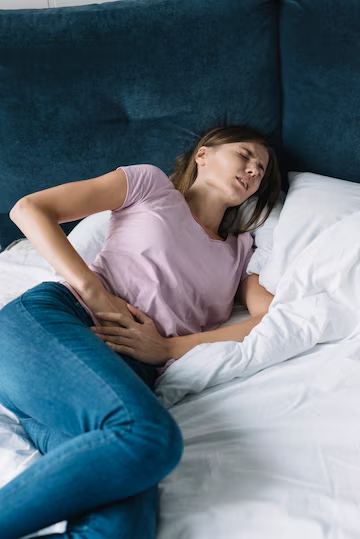Colitis infection, also called colic, is a term used to describe varying pain caused by gastrointestinal or other organs in the belly. Colitis can be linked to several different conditions or infections that would be present. It is most common in infants, though it may occur in adults due to various underlying causes.
TYPES OF COLIC

- Description: It happens mainly within the first few months of life and is more common among newborns and infants.
- Symptoms: Prolonged crying spells, irritability, and discomfort, usually at the same time each day.
- Causes: There is no actual reason, but it could be connected to g.i. Discomfort, gas, or an immature digestive system while considering some food or formula sensitivities as potential factors.
- Treatment:
01.Soothing techniques: Swaddling, rocking and pacifiers may be recommended.
02.Dietary changes: This might involve altering how feeding is done or changing formulas.
- Prevention: Proper feeding techniques and monitoring of the infant’s diet.
- Description: Very severe pain arising from kidney stones or other obstructions in the urinary tract.
- Symptoms: Sharp cramping pains at the lower back or sides with nausea, vomiting, and blood in urine.
- Causes: These may include kidney stones and urinary tract infections (UTIs), among others.
- Treatment:
01.Pain management: NSAIDs or opioids are used to control pain.
02.Medical intervention: Surgical procedures might be done in severe cases or lithotripsy for breaking up kidney stones.
- Prevention: Staying hydrated and dietary changes to prevent kidney stones.
- Description: This type of pain results from gallstones that block bile ducts.
- Symptoms: Such are sudden severe upper right quadrant pains radiating into the shoulder blade area or vomiting plus nausea as well.
- Causes: They are primarily gallstones; otherwise, cholecystitis, meaning inflammation within the gallbladder, might bring about this condition, too.
- Treatment:
01.Pain relief: Analgesics and antispasmodics may be given to relieve the pain associated with this condition.
02.Surgical intervention: This involves removing the gallbladder through cholecystectomy once the gallstone is confirmed as the leading cause of such symptoms, alongside other treatments that would follow with it.
- Prevention: Maintaining a healthy weight and diet to reduce the risk of gallstones.
- Description: These are spasmodic pains caused by a blockage or infection within the intestines.
- Symptoms: Severe pain in the abdomen, bloating, constipation or diarrhoea and sometimes fever.
- Causes: Obstruction of the intestines, Gastroenteritis and IBD (inflammatory bowel disease), among other diseases, result in severe cramping pain.
- Treatment:
01.Treating infection: For bacterial infections, antibiotics.
02.Managing blockages: Surgery or endoscopic procedures to remove obstructions.
- Prevention: Managing chronic conditions like IBS or IBD, and avoiding known triggers.
CAUSES OF COLIC INFECTION
Gastroenteritis
It occurs when viral or bacterial infections bring about inflammation of both the stomach and intestines.
Symptoms: Among others are diarrhoea, vomiting, fever and abdominal cramps.
Intestinal Obstructions
These might be caused by tumours, hernias, or adhesions in the intestine, which is otherwise known as intestinal obstruction in medical terms.
Symptoms: Such may include intense cramp-like pains, often accompanied by vomiting, causing severe obstipation, which is associated with an inflated belly cavity.
Urinary Tract Infections (UTIs)
These are bacterial infections that affect the
urinary system.
Symptoms: Painful urination, urgent need to pee often and lower belly pain.
Gallbladder Infections
Infection or inflammation of gallstones can lead to gallbladder infections, mostly cholecystitis, which causes this condition, too.
Symptoms: The symptoms for this condition commonly involve severe pain, including high fever and yellowing of one's skin plus eyes (jaundice).
DIAGNOSIS
Blood Tests: These help detect signs related to infection/inflammation.
Imagining Studies: Imaging Studies like ultrasound, X-ray or CT scans to identify stones, obstructions and other abnormalities.
Urine Tests: These are used to detect infections as well as kidney stones.
Stool Tests: It can help diagnose gastrointestinal infections and parasites.
WHY TO CHOOSE US ?
If you choose AD Hospital to manage your colic infections, you will access world-class medical services tailored just to your personal needs. The following are some reasons why we believe that AD Hospital is the best facility for managing colic infections:
Expert Medical
Team
Our hospital has distinguished professionals such as gastroenterologists, paediatricians, urologists, and surgeons, among others, who have profound knowledge and vast experience in handling various types of colic accurately and effectively.
Patient-Centered
Care
At AD Hospital, we prioritize our patients' comfort and wellbeing above all else. We guarantee compassionate care and ensure that our patients are always at ease when they come for treatment. Our team of professionals ensures that every patient gets personalized attention and support.
Advanced Diagnostic
Facilities
This medical facility possesses imaging technologies such as ultrasounds, CT scans, and MRI machines, which are all cutting-edge tools used to diagnose underlying factors causing infantile colics accurately. This results in successful treatment targeting only the root causes.
Efficient and Timely
Service
Colic infections are medical conditions in which quick response is critical, so we strive to provide fast service delivery on such matters. Simplified procedures reduce workflow, which implies minimal waiting periods and prompt interventions, saving lives.
Comprehensive Treatment Plans
We individually design patient-specific treatment plans based on extensive evaluation of their respective medical situations. Our team takes a multidisciplinary approach, addressing all aspects related to this condition so our patients get complete attention and care.
Post-Treatment Support and Follow-Up
Post-treatment services extensively entail constant checkups, consideration of potential side effects, and aiding clients' quick recovery. Our team provides additional advice depending on the requirement after a follow-up consultation to achieve positive results.
